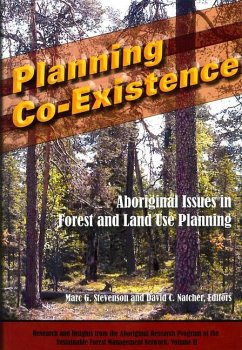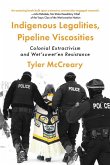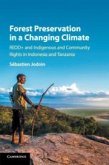For centuries Canada's Aboriginal peoples have sought to enter into treaties of peace and friendship with colonial settlers based on the principles of sharing and co-existence. However, the latter remains an elusive goal as the land use rights and interests of Canada's Aboriginal peoples have yet to be reconciled with those of other Canadians. To date, the solutions have been inequitable, forcing Aboriginal peoples to either accept the policies and institutions imposed upon them by the Canadian State, or refuse to participate at all. Planning Co-Existence-the second of two volumes highlighting the critical research of the Aboriginal Program of the Sustainable Forest Management Network-presents the question: How do we begin to accommodate the land and resource use rights and interests of Canada's Aboriginal peoples while finding common ground for co-existence with other Canadians who have come to occupy these shared spaces? By addressing this question, Planning Co-Existence explores the current state of land use planning in Canada, what may be required to meet the Crown's legal and fiduciary obligations in these processes, and a variety of issues of central importance to Aboriginal peoples that need to be addressed in the design and implementation of forestry and land use plans. In so doing, this volume lays the groundwork for a more informed discussion about reconciliation and co-existence in the context of Aboriginal land use planning in Canada in the hope of achieving social and environmental justice sooner rather than later. Introduction by: Marc G. Stevenson and David C. Natcher. Chapters by: Jim S. Frideres and Cash Rowe; Marc G. Stevenson; Jimmie R. Webb; Jimmie R. Webb; Monique Passelac-Ross; Eddison Lee-Johnson and Ronald Trosper; Nathan Deutsch and Iain Davidson-Hunt; Daniel D. Kneeshaw, Mario Larouche, Hugo Asselin, Marie-Christine Adam, Marie Saint-Arnaud, and Gerardo Reyes; Stephen Wyatt, David C. Natcher, Peggy Smith, and Jean-Francois Fortier; Deborah McGregor; M.A. (Peggy) Smith, Erin Symington, and Sarah Allen; Marc G. Stevenson and Pamela Perreault; Brent Kuefler, Adrian Tanner, and David C. Natcher; Marc G. Stevenson and David C. Natcher.
Hinweis: Dieser Artikel kann nur an eine deutsche Lieferadresse ausgeliefert werden.
Hinweis: Dieser Artikel kann nur an eine deutsche Lieferadresse ausgeliefert werden.








